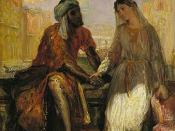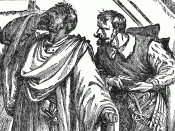Sophocles does not include violence in his plays. If there is bloodshed it occurs off-stage. On the other end, Shakespeare's Othello presents violence on stage. In my opinion there are three ways to look at this events.
First is whether there is a need to show violence and bloodshed on stage, in order to make the play more intriguing/interesting and amplifying the tragic events? Second is whether there is no need of bloodshed on stage to make the play interesting and to create the effect of the tragic events.
Third is whether the audience at the theatre prefers to see violence on stage or in the background to enjoy the play.
Sophocles uses back-stage violence and Shakespeare uses on-stage violence. We can see there is a difference between the two authors, and yet they both tell a tragic story, each one in his own unique way. The only question is if one way is preferred on the other way.
At the end of this essay we will find out.
If we look at violence on stage, and we look at Shakespeare's Othello play story, we can see the significance of the ending events of act V. This act finishes the debates and conflicts that developed during the play and sealing them with death events. Desdemona dies as Othello says "it is too late (Smothers her)"ÃÂ, Roderigo after been wounded by Cassio he meets Iago that says "O murd'rous slave! O villain! (Stabs Roderigo)"ÃÂ, Emilia after accusing Iago of lying and Othello of murder, Othello says "are there no stones in heaven but what serves for the thunder? Precious villain! (the moor runs at Iago [but is disarmed by Montano]. Iago kills his wife)"ÃÂ. Othello after grieving his deeds he says "I kissed thee ere I killed thee. No way but this, killing myself, to die upon a kiss (he [falls upon the bed and] dies)"ÃÂ.
These quoted events show us the tragic of death and murder. The audience actually sees the murderous deeds on stage and catches the horror of those actions. That's the point of showing violence on stage. There are two disadvantages of on-stage violence: 1. There is no room to use the audience's imagination (as they can see what is happening). 2. The horror of seeing the actual murder takes place is quite devastating and horrifying. The audience might not enjoy seeing that.
Back-stage violence seems to be more sensible and durable. Sophocles uses back-stage violence when Oedipus finds out the whole hidden truth about his father and his mother (his wife), he pokes his eyes out, and requests to be sent away, to be banished. The descriptions Sophocles is using are leaving a lot for the imagination, the audience doesn't see the actual violent act, he hears a description of the process, and the imagination does the rest. The audience can feel the pain penetrating as they are using their imagination, interpreting the full extent of the horrifying action. The audience is using their imagination to receive the horrible tragedy. Sophocles intend to effect the audience by leaving the horrifying actions to their imaginations. The imagination can translate the horrible act description into something even more horrifying then the horrible act, if it would have been directed for an on-stage action. This is the full extent of Sophocles idea on how to transmit his tragic ideas to the audience.
If we look at the audience while watching both plays, we might see their faces twitch during horrible on-stage events or back-stage events. If we look at the audience's faces during both plays we will be able to see that they react almost the same when a horrible event take place during the play. But there will be a slight difference between the two types of violence. The audience will react to on-stage violence with disgust. The effect of on-stage violence effects the audience immediately, as the horror is places in front of the beholder. On-stage violence shows the full extent of the horrible actions and the audience has to digest and consume it. The audience will prefer Sophocles way of showing tragedies and not to see the violence in their own eyes.
Both authors create amazing stories. They are both famous for their plays and tragedies. But, each one of them uses a different way of showing violence in their plays. Both ways emphasis the full extent of the tragedy described but I think I would have preferred Sophocles way. The mind and the imagination are the best tools for the audience to use. There are so many ways to imagine events and they are different from one person to another. Each one in the audience might translate and interpret the events in a different way. Because people are different, people don't think the same. On-stage violence reveals exactly what happened, but back-stage violence leaves the interpretation to the viewer. Both authors write sophisticated plots and intriguing plays, but I would prefer Sophocles way of introducing violence, using back-stage violence and living the audience to imagine the happenings.





![From the Library of Congress: TITLE: Thos. W. Keene. Othello CALL NUMBER: POS - TH - 1884 .O7, no. 1 (C size) [P&P] REPRODUCTION NUMBER: LC-USZC6-58 (color film copy transparency) RIGHTS INFORMATION: No known restrictions on publication. MEDIUM: 1 print (](https://s.writework.com/uploads/9/94760/library-congress-title-thos-w-keene-othello-call-number-pos-thumb.jpg)